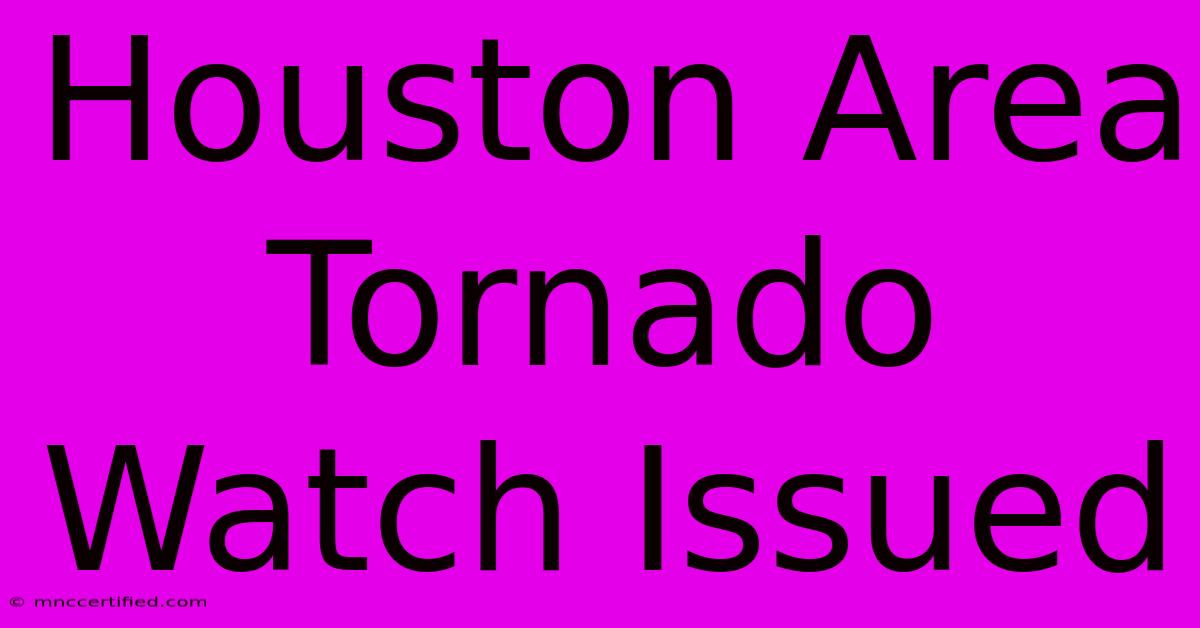Houston Area Tornado Watch Issued

Table of Contents
Houston Area Tornado Watch Issued: Staying Safe During Severe Weather
A tornado watch has been issued for the Houston area. This means that conditions are favorable for tornadoes to develop. While a tornado isn't imminent, it's crucial to take precautions and be prepared for severe weather. This article will guide you on how to stay safe during a tornado watch and what actions to take to protect yourself and your family.
Understanding Tornado Watches and Warnings
It's vital to understand the difference between a tornado watch and a tornado warning.
-
Tornado Watch: This means conditions are favorable for tornadoes to develop. Be prepared to act quickly if a warning is issued. Stay informed and monitor weather reports closely.
-
Tornado Warning: This means a tornado has been sighted or indicated by weather radar. Take immediate action to seek shelter. This is a life-threatening situation.
Staying Safe During a Tornado Watch in Houston
The Houston area, while not known for frequent tornadoes compared to Tornado Alley, is still susceptible to severe weather events. Staying informed and prepared is key to staying safe.
1. Stay Informed: Monitor Weather Reports
- National Weather Service (NWS): The NWS is your primary source for reliable weather information. Monitor their website and social media channels for updates.
- Local News Channels: Local news stations provide real-time updates and often have weather experts who can provide context and analysis specific to the Houston area.
- Weather Apps: Download a reputable weather app on your smartphone for push notifications and up-to-the-minute alerts. Consider apps from reputable sources such as The Weather Channel or AccuWeather.
2. Develop a Family Plan
Have a pre-determined plan for what everyone in your household will do if a tornado warning is issued. This plan should include:
- Designated Safe Room: Identify a safe room in your house – ideally a basement or an interior room on the lowest floor. If you don't have a basement, choose a small, interior room without windows, such as a closet or bathroom.
- Meeting Point: Establish a meeting point outside your home in case you need to evacuate.
- Emergency Kit: Keep an emergency kit readily accessible, including water, non-perishable food, flashlights, batteries, a first-aid kit, and important documents.
3. Know the Signs of a Tornado
Knowing the visual signs of an approaching tornado can help you react quickly. Look out for:
- Dark, greenish sky: This indicates the presence of large hail and heavy precipitation, often associated with severe thunderstorms.
- Large hail: Hailstones larger than an inch in diameter are a serious threat and often precede tornadoes.
- Loud roar: A loud roar, like a freight train, is a very clear warning that a tornado is near.
- Rotating cloud: A rotating, funnel-shaped cloud is a classic sign of a tornado.
4. Secure Your Property
Before a tornado strikes, take steps to protect your property:
- Bring loose objects inside: Secure anything that could be blown away, such as patio furniture, garbage cans, and outdoor decorations.
- Park your car in a garage: If you have a garage, park your car inside to protect it from damage.
- Close and lock all windows and doors: This will help minimize damage to your house.
What to Do During a Tornado Warning in Houston
If a tornado warning is issued, immediately seek shelter in your designated safe room. Get as low to the ground as possible and cover your head. Stay away from windows and exterior walls.
After the Tornado
Once the tornado has passed, check yourself and your family for injuries. Then, cautiously assess any damage to your home and property. Report any damage to local authorities and avoid downed power lines or other hazards. Stay updated on weather reports for any further severe weather threats.
By following these guidelines, you can significantly increase your safety during a tornado watch or warning in the Houston area. Remember, preparation and awareness are key to surviving severe weather.

Thank you for visiting our website wich cover about Houston Area Tornado Watch Issued. We hope the information provided has been useful to you. Feel free to contact us if you have any questions or need further assistance. See you next time and dont miss to bookmark.
Featured Posts
-
Will Tuchel Change Coaching Methods
Nov 19, 2024
-
Denmark Vs Spain Hojbjerg Calls For Changes
Nov 19, 2024
-
Medical Spa Malpractice Insurance
Nov 19, 2024
-
Insurance Call Center Outsourcing
Nov 19, 2024
-
18 11 2024 Liechtenstein Vs San Marino Football Preview
Nov 19, 2024